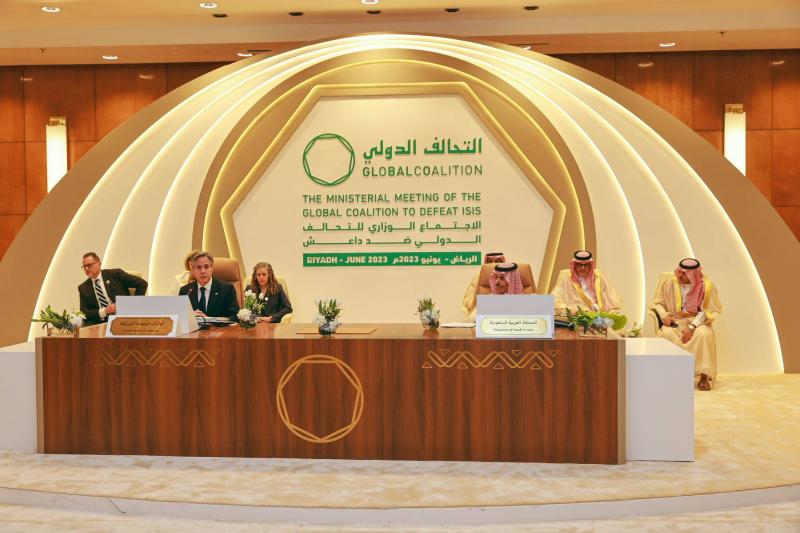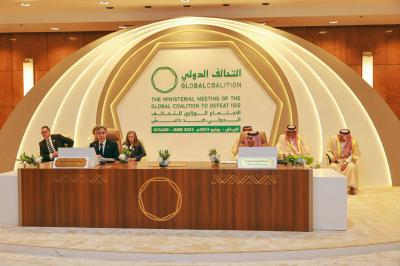Saudi Foreign Minister Prince Faisal bin Farhan stated on Thursday that it is "regrettable and completely unacceptable" for wealthy nations to shirk their responsibilities regarding the repatriation of their citizens who were detained during the fight against ISIS. He emphasized the importance of combating extremism and continuing efforts to prevent the return of the terrorist organization. He said, "I urge those countries to act and take responsibility as part of a coalition that means working together." In his closing remarks at the "International Coalition" meeting against ISIS held in Riyadh, he asserted that "the Kingdom will make every effort to pursue ISIS wherever it may be found." He also affirmed that "Saudi Arabia believes in the need to confront terrorism and extremist ideology," adding that it will continue coordinated efforts to eradicate the scourge of terrorism from its roots. He urged all countries to work together to spread values of tolerance and dialogue, noting that "Saudi Vision 2030 focuses on sustainable development, supporting youth, and fostering dialogue."
He mentioned that the meeting discussed measures to counter terrorism in Afghanistan to prevent it from becoming a haven, stressing the need for countries to reclaim their "ISIS fighters" and rehabilitate them, especially in the African coast. He lamented that there are still advanced countries that refuse to repatriate their terrorists, leaving the burden on poorer nations. He said, "Extremism and terrorism should not be linked to any religion, and Muslims should not be subjected to harassment due to the actions of rogue individuals." He continued: "We want to end the Iranian presence in Syria, and there is no alternative to dialogue with Damascus, especially as it has made very clear commitments to address the concerns of the international community."
Regarding relations with Israel, he stated: "We believe that normalization with Israel would have significant benefits for everyone, but these benefits will be limited without a path to peace with the Palestinians." Concerning the Syrian refugee situation in Lebanon, he remarked, "Lebanon cannot bear the burden of 2 million Syrian refugees, and we seek to find safe ways for their return."
U.S. Secretary of State Antony Blinken confirmed that "the United States is committed to defeating ISIS and eliminating the scourge of terrorism." However, he warned that Afghanistan and some African regions have seen an increase in ISIS attacks. In his speech at the meeting, he cautioned that "keeping foreign ISIS fighters in camps threatens the return of the organization." He called on the relevant countries to "repatriate their citizens from foreign ISIS fighters," considering this step crucial for dismantling the Al-Hol camp in Syria. Blinken also expressed hope that Washington would allocate $148.7 million for stabilization efforts in Syria and Iraq. He added, "Together we can make progress and build a vision for our common future, and we appreciate Saudi Arabia's leadership in organizing this meeting."
He noted, "We have made progress on various levels with our Saudi partners, the Gulf Cooperation Council, and the international coalition. We are pleased to see countries taking efforts to reintegrate their fighters." He stressed that countries must reclaim their "ISIS fighters" from Al-Hol camp and elsewhere. He highlighted cooperation with the Gulf Cooperation Council to address piracy and ship control, noting that the best way to tackle these issues is to reinforce and stabilize relations.
Regarding Sudan, he stated, "We are leading a campaign for a ceasefire, and we will continue our efforts to halt hostilities." He also mentioned the need to address the issue of Captagon drugs and reaffirmed that the United States would continue its partnership with Ethiopia to reach a solution to end the violence there. He stressed the importance of partnership to address the climate crisis, involving women in public life, and focusing on human rights in the shared agenda. He commended the role played by the first Arab female astronaut, Rayyan Barnawi, as a symbol of the progress made by Arab women.
He affirmed, "We are not asking the world to choose between China and the United States, and we will see if it is possible to make progress in Syria in accordance with Resolution 2254." He remarked that he was skeptical that the Assad regime would do what is required, agreeing with Saudi Arabia on key issues.
The international coalition was established under U.S. leadership in 2014, following the rise of the ISIS organization in Iraq and neighboring Syria. Since the announcement of the defeat of the "caliphate" in 2019, the Kurdish self-administration has called on the concerned countries to repatriate their citizens from ISIS families residing in camps, especially in Al-Hol, which experiences killings, chaos, and security incidents. Despite these calls, most countries have not repatriated their citizens. A few countries, such as Uzbekistan, Kazakhstan, and Kosovo, have taken back a significant number of their citizens, while others, particularly European nations, have only repatriated a limited number of women and children.
In March, the commander of U.S. Central Command, General Michael Kurilla, warned that ISIS fighters held in Syria and Iraq represent a "real army in detention," highlighting that if they are freed, they would pose a significant threat, stating, "there is no military solution for the detainment of the organization." While Iraqi courts have issued hundreds of death sentences or life imprisonment rulings against those accused of belonging to the organization, the Kurdish self-administration in northeastern Syria warns that it does not have sufficient capabilities to continue holding them, let alone prosecute them.
Last month, the international coalition reported a decline in ISIS attacks in Iraq and Syria during the first months of 2023, by 68% compared to the same period the previous year. However, ISIS elements remain active in rural and remote areas, launching sporadic attacks. According to estimates published in a United Nations Security Council report in February, the organization has "between 5,000 to 7,000 members and supporters spread between Iraq and Syria," with "about half of them being fighters."
The Saudi and U.S. ministers met on Wednesday on the sidelines of the ministerial meeting of the Gulf Cooperation Council in Riyadh, discussing the strategic partnership between the two countries and ways to enhance bilateral cooperation in various fields, in addition to updates on regional and international developments.




